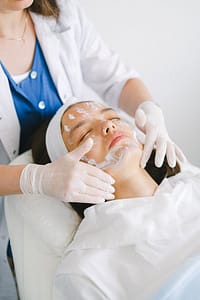Understanding Skin Changes
Impact of Hormonal Fluctuations
Navigating the journey through perimenopause, you may notice your skin undergoing various changes. This phase is characterized by rapid fluctuations in hormones, which can significantly impact the condition and appearance of your skin. Estrogen, in particular, plays a pivotal role in maintaining skin hydration and elasticity. As estrogen levels begin to waver during perimenopause, you might observe your skin becoming drier and less plump, as well as experiencing a loss of firmness (OneSkin).
Hormonal variations can lead to a decrease in the production of natural oils, leaving your skin feeling parched and flaky. Additionally, these hormonal changes may exacerbate or trigger skin conditions such as acne, eczema, and rosacea, making skin care during this time more challenging. The link between hormonal skin changes and various stages of a woman’s life, such as puberty, pregnancy, menstruation, after childbirth, and menopause, highlights the influence of hormones on skin health.
Common Skin Problems
During perimenopause, common skin issues that you may encounter include:
- Dry and flaky skin: A drop in estrogen can reduce your skin’s ability to produce oil and retain moisture, leading to dryness (Healthline).
- Acne breakouts: Hormonal imbalances can trigger acne, even if you haven’t experienced it since adolescence.
- Eczema: The skin may become more sensitive and prone to eczema flare-ups.
- Sagging skin: Collagen, which provides structure to the skin, decreases significantly during menopause, contributing to a loss of elasticity (Healthline).
- Hyperpigmentation and discoloration: Age spots and larger areas of darker skin can develop due to previous sun exposure and hormonal changes (American Academy of Dermatology).
These skin changes can affect not only your appearance but also your self-esteem. Understanding these changes is the first step in managing them effectively. In addition to hormonal shifts, external factors like stress, nutrition, and hydration can also play a significant role in your skin’s health during perimenopause. By recognizing these common skin problems and their causes, you can take proactive steps to maintain your skin’s radiance and resilience throughout this transitional phase.
Effects of Collagen Loss
As you approach and go through menopause, one of the significant changes your skin will undergo is the loss of collagen. Understanding the implications of this loss and recognizing the signs can help you take proactive steps in managing your skin’s health.
Collagen Depletion in Menopause
Collagen is a protein that provides structure and elasticity to your skin. During menopause, you may experience a considerable drop in collagen levels. The American Academy of Dermatology has reported that women can lose up to 30% of their skin collagen in the first five years of menopause, followed by an annual loss of about 2% over the subsequent two decades (Healthline). Estrogen plays a vital role in stimulating collagen production, and as estrogen levels decline during menopause, so does collagen synthesis. This process leads to various noticeable changes in skin appearance and texture.
| Age Range | Collagen Loss Rate |
|---|---|
| 25-45 | 1% per year |
| 45-55 | 5% per year |
| Post-Menopause | 2% per year |
Data adapted from Dr Victoria and Balance Menopause.
Signs of Collagen Reduction
The depletion of collagen during menopause can manifest in several visible ways. You might notice that your skin loses its firmness and begins to sag, leading to the formation of jowls and wrinkles. Additionally, the pores on your skin may appear larger as the skin’s structure weakens.
Signs of Collagen Reduction:
- Sagging skin
- Increased presence of wrinkles and fine lines
- Jowls formation
- Enlarged pores
Research from the American Academy of Dermatology emphasizes the importance of sun protection and the use of skincare products containing ingredients like retinol or peptides, which can support collagen production. To further assist with the changes your skin is going through, incorporating antioxidant-rich products, ingredients that boost collagen, and products with phytoestrogens can be beneficial (Quora).
In navigating skin changes during menopause, it’s essential to be aware of these indicators of collagen loss. By doing so, you can choose targeted treatments and adjust your skincare routine to better support your skin’s needs during this transformative period. For more information on how to adapt to various hormonal skin changes, explore our articles on skin changes during pregnancy, skin changes during puberty, skin changes after childbirth, skin changes during menstruation, skin changes and stress, skin changes and nutrition, and skin changes and hydration.
Managing Dryness and Sensitivity
Navigating through perimenopause, your skin undergoes a myriad of changes, predominantly due to a drop in estrogen levels. This can lead to increased dryness and sensitivity. Managing these skin changes during perimenopause is vital for maintaining skin health and comfort.
Combatting Dry Skin
During menopause, skin loses some of its ability to retain water, leading to pronounced dryness, particularly in arid conditions. To combat this:
- Cleanse Gently: Use a mild cleanser that doesn’t strip your skin of its natural oils. This helps preserve the skin’s delicate moisture barrier.
- Moisturize Effectively: Apply a moisturizer containing hyaluronic acid or glycerin to help draw water into the skin. Look for products that are rich in emollients and humectants to provide lasting hydration.
- Consult a Dermatologist: For persistent dryness, consider seeking advice from a dermatologist. They may recommend treatments such as exfoliation to remove dead skin cells or microdermabrasion to rejuvenate the skin.
Remember, your skin’s hydration needs may change during this time, so it’s important to adapt your skincare routine accordingly. For more information on how hormonal fluctuations influence your skin, explore our articles on hormonal skin changes and skin changes during menopause.
Addressing Skin Sensitivity
As your skin becomes thinner and loses elasticity during menopause, it may also become more sensitive. Here’s what you can do:
- Choose Hypoallergenic Products: Select skincare products that are free from fragrances and irritants that can aggravate sensitive skin.
- Protect Your Skin: Use a broad-spectrum sunscreen with an SPF of 30 or higher to protect against sun damage, which can exacerbate skin sensitivity.
- Nourish From Within: Embrace a nutritious diet rich in antioxidants and essential fatty acids to support skin health. Learn more about skin changes and nutrition.
- Stay Hydrated: Ensure adequate hydration by drinking plenty of water throughout the day, which can help maintain the skin’s moisture level. Discover the connection between skin changes and hydration.
By implementing a skin care regimen tailored to your skin’s evolving needs during perimenopause, you can help alleviate dryness and sensitivity, fostering radiant and comfortable skin at any age.
Treatment Options for Skin Changes
Navigating the landscape of skin changes during perimenopause can be challenging, but with the right treatment options, you can maintain vibrant and healthy skin. From meticulously formulated skincare products to professional treatments designed for skin maintenance, there are numerous avenues you can explore to manage the skin changes associated with this transition.
Skincare Products and Ingredients
During perimenopause, your skin may require extra care to combat the effects of hormonal changes and collagen loss. To address these changes, it’s essential to integrate skincare products that are rich in ingredients known to support skin health during this stage.
- Retinol: A derivative of vitamin A, retinol is renowned for its anti-aging properties. It helps to accelerate skin renewal, boost collagen production, and reduce the appearance of fine lines and wrinkles.
- Peptides: These amino acid chains can signal your skin to produce more collagen, which is vital for maintaining skin firmness and elasticity.
- Antioxidants: Products containing antioxidants such as vitamin C, E, and ferulic acid can protect the skin from environmental damage while enhancing brightness and texture.
- Hyaluronic Acid: Known for its ability to retain moisture, hyaluronic acid can help keep your skin hydrated and plump.
- Phytoestrogens: Compounds that mimic estrogen, such as those found in soy, can help mitigate some of the effects of decreased estrogen levels on the skin.
Using a combination of these powerful ingredients can help support your skin’s structure and hydration levels. For a comprehensive list of skincare products tailored to perimenopausal skin, visit our section on skin changes and nutrition.
Professional Treatments for Skin Maintenance
In addition to at-home skincare, professional treatments can play a significant role in maintaining your skin’s health and appearance during perimenopause.
- Facials: Regular professional facials can provide deep cleansing, hydration, and exfoliation, which are beneficial for keeping the skin clear and radiant.
- Microdermabrasion: This exfoliative treatment gently removes the outermost layer of dead skin cells, helping to refresh the skin’s appearance and stimulate new cell growth.
- Laser Treatments: Laser therapy can target various skin concerns, including wrinkles and uneven pigmentation, and is effective in promoting collagen production for firmer, smoother skin.
These treatments, when performed by qualified skin care professionals, can significantly improve the texture and appearance of your skin. It’s important to consult with a dermatologist or skincare specialist to determine the most suitable treatments for your specific skin concerns during perimenopause.
By combining both at-home and professional skincare strategies, you can effectively manage the skin changes during perimenopause. Embracing a routine that includes products with key ingredients and seeking treatments that support skin health can help you maintain a radiant complexion through this natural phase of life. Remember to always discuss any new skincare regimen or treatments with a healthcare professional, particularly during a time of such significant hormonal changes.


